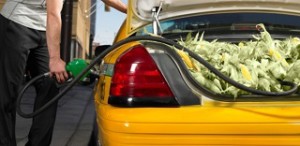Alternative Auto Fuels
Here’s an interesting table from the Alternative Fuels Data Center:
Infrastructure: US Fueling and Charging Stations
Biodiesel (B20 and above): 227
Compressed Natural Gas (CNG): 907
Electric Vehicle Charging Stations: 12,695
Ethanol (E85): 2,815
Hydrogen: 23
Liquefied Natural Gas (LNG): 75
Liquefied Petroleum Gas (Propane): 1,543
My only comment, albeit it obvious, is that the market will not support seven different types of alternative fuels. Eventually the winners will win and the losers will lose.
So if that’s true, why do they still exist? That is, why on Earth are there so many propane stations, when the penetration of propane can only wither and die?
Look at it this way: there are five fossil fuels choices there, and one more hydrocarbon. Then there is electric transportation that is charged with renewable energy more with each passing month. It’s the obvious winner. Can’t we cut to the chase here?


Insightful comments, Craig. I expect that electrified transportation will be the majority power source in 50 years, and that alternative energy (such as renewable diesel and DME) will make up the rest for transportation fuel. That’s assuming gasoline and diesel prices will go back up and government mandates stick to emissions reductions. There’s also mass adoption by consumers, fleets, and transport companies. I still think the odds are good for those three market forces to come together, at least in 50 years.
Well, you and I haven’t talked about this, but I’m one of these people who thinks that change is going to come very rapidly in this arena. Pundits, of course, offer nice, slow and smooth adoption curves. The fact that they’re almost always wrong doesn’t deter them from creating more such graphs. I believe that once the range of EVs is acceptable and the prices is at parity with gas-powered engines, the game will be over very quickly.
Craig,
I believe you are correct when you say once EV’s gain parity in price and performance with ICE, the market for ICE vehicles will rapidly diminish.
However, such an event requires advances in technology and infrastructure that don’t currently exist. In the meantime, many automakers are looking to Hydrogen as a means of producing Zero Emission vehicles while still retaining all the infrastructure of gasoline-diesel vehicles. Governments are also interested in promoting H2 fuels since the tax revenue status quo would be unaffected by the adoption of H2.
We live in interesting times.
Please see: http://www.2greenenergy.com/2016/03/21/how-big-a-deal-is-the-electric-vehicle-charging-infrastructure/.
I hope it happens much faster than 50 years. Perhaps autonomous systems will help move it along.
Yes, I think it will, though I’m not 100% sure why. Call me paranoid, but I consider the movement to autonomous cars and alternative hydrocarbon fuels as distractions, the work of the people who REALLY don’t want to see EVs happen. Wonder who that could be? 🙂
There are so many LP fueling stations because it is a quick add-on to existing facilities that serve conventional uses of propane. Ag grain dryers all have large storage facilities that can supply the transportation market. Large sections of the country use LP as the most economical source of clean heating fuel. The central depot distribution centers make good transportation fueling stations. Hydrogen does not have as many alternative use depots. Biodiesel is just ridiculously expensive even if the fueling station cost was free.
Some time ago, while traveling through the midwest, I was surprised to discover that lots of farm equipment was powered with propane. It was so common that people were discussing cooling a can of coke using a spray of propane.
I suspect hydrogen will expand simply because it will be financed by the petrochemical industry ( and made from fossil fuels )
Ethanol also has a lobby behind its use and expansion.
CNG has a showing because of laws in Utah that require CNG to be offered by gas dealers at what was once comparatively cheap energy prices.